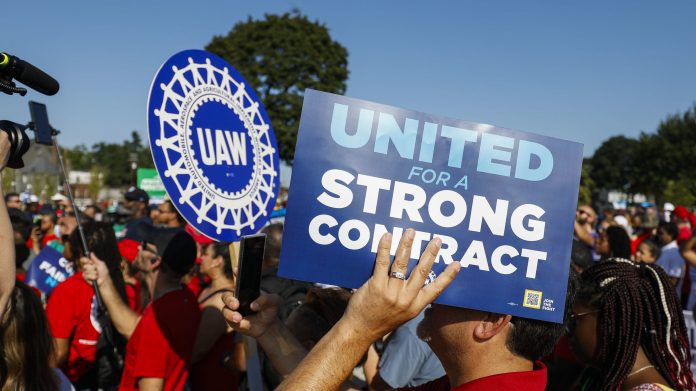The United Auto Workers union has ratified its contracts with Detroit-Three manufacturers, following more than two weeks of voting among its members.
General Motors was the first to see voting complete, followed by Stellantis, then Ford. Despite earlier signs of discontent among some members, the United Auto Workers union was able to ratify all three contracts with relative ease. The agreements will raise pay for manufacturing employees by 25% over the next four years and include commitments to re-introduce cost-of-living adjustments, improve benefits, incorporate union members into electrification plans, accelerate paths to full-time employment for temporary workers and end the use of wage tiers. General Motors was the first company to see voting conclude, while Ford was last.
Ford and Stellantis saw similar levels of endorsement among their respective labor pools, who cast ballots overwhelmingly in favor of accepting their offers. Both contracts won more than 60% of the union vote, with teams at multiple Ford factories and at least one Stellantis facility reporting approval ratings exceeding 90%. Ford was the first to reach a tentative agreement with United Auto Workers negotiators, which then became the basis for successive deals at other Detroit-Three brands. As part of its contract, Stellantis agreed to reopen the Jeep Cherokee plant in Illinois after idling the facility earlier this year.
Employees of General Motors voted to ratify their new contract but with markedly less enthusiasm than those at Ford and Stellantis. Roughly 53% of the company’s 30,860 United Auto Workers members cast ballots in favor of the agreement, with final tallies reported Thursday evening. While still a decided victory on behalf of GM, several of the company’s biggest factories, including Spring Hill Manufacturing, Flint Truck Assembly and Fort Wayne Assembly, rejected the deal, sparking fears that the UAW could be forced to re-enter negotiations. General Motors was the last of the Detroit-Three brands to reach an agreement with the union. Throughout the six-week strike, the company appeared to be the least willing to offer concessions despite facing increasingly aggressive backlash from United Auto Workers leaders.




